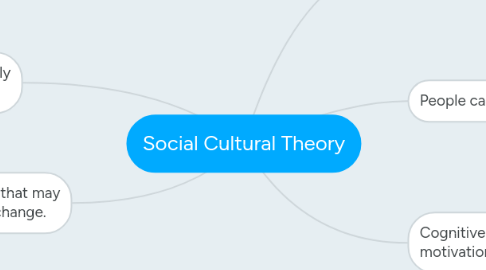Social Cultural Theory
by Lauren Bather


1. Behavior becomes increasingly self-regulated.
1.1. As children grow, they increasingly monitor their behaviors and thought processes as a means to accomplish their goals.
1.1.1. Self-Reguation
1.2. Teach students strategies through which they can better control their own behavior and direct their own learning.
2. Learning is an internal process that may or may not lead to a behavior change.
2.1. Some learning is not initially evident because the proper situation hasn't presented itself yet.
2.1.1. Comparing Theoretical Perspectives of Learning
2.2. Remember that new learning doesn't always reveal itself immediately but may instead be reflected in students' behaviors at a later time.
3. People and their environments mutually influence eachother.
3.1. Person variables influence the environment the individual builds, thus influencing learning opportunities.
3.1.1. The Social Cognitive View of Reinforcement and Punishment
3.2. Encourage students to make choices that will lead to valuable learning experiences.
4. People can learn by observing others.
4.1. The process of learning through observation can be related to the way young children often mimic adult activities.
4.1.1. Modeling
4.2. Help students acquire new behaviors more quickly by demonstrating those behaviors yourself.
5. Cognitive processes influence motivations as well as learning.
5.1. As cognitive processing abilities increase, so does self-efficacy. High self-efficacy lends itself to higher goal setting and thus increased motivation.
5.1.1. Self-Efficacy

